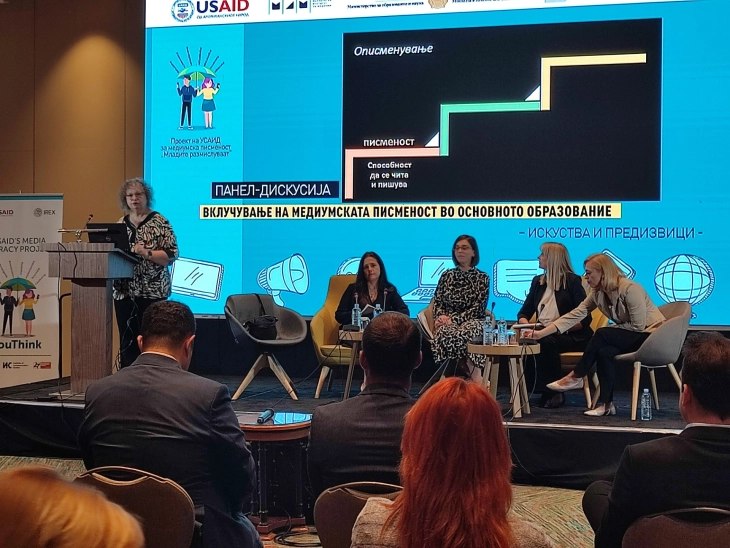Primary education media literacy framework presented at panel discussion
- The key competencies that students acquire by developing their media literacy are the ability to think critically; to use information in a smart way; to recognize a voiced opinion; to create content responsibly; and they understand the aim of the messages, said Professor Violeta Petroska-Beshka, representative of the working group charged with drafting the Framework for media literacy in primary education, at a panel discussion Monday during which the Framework was presented.
- Post By Angel Dimoski
- 13:28, 2 October, 2023

Skopje, 2 October 2023 (MIA) – The key competencies that students acquire by developing their media literacy are the ability to think critically; to use information in a smart way; to recognize a voiced opinion; to create content responsibly; and they understand the aim of the messages, said Professor Violeta Petroska-Beshka, representative of the working group charged with drafting the Framework for media literacy in primary education, at a panel discussion Monday during which the Framework was presented.
The document within the Framework includes syllabi for specific subjects from first through to ninth grade, which cover media literacy as a special topic with defined study results, content, and grading standards.
At the panel discussion focused on the experiences and challenges of incorporating media literacy into primary schools, prof. Petroska-Beshka noted that by developing their media literacy, the students are empowering themselves from several aspects.
“The key competencies they acquire are the ability to think critically, i.e., to discover the meaning of messages, to create messages through which they will be able to voice their own opinion, to use information in a smart way, i.e., to determine their reliability and the intention and techniques used in reporting. To recognize a voiced opinion, to value different perspectives and to use information in order to create and modify their own views,” said Petroska-Beshka.

Minister of Education and Science Jeton Shaqiri highlighted that the project began at the same time when the Education Ministry launched the most significant reforms in education.
“When there are a million information, especially on the internet, where students spend a sizeable amount of their time, it is necessary to learn to analyze and recognize what is real news, and what is false information and speculation with hidden intentions. That’s why USAID’s support for this project is very important,” said Shaqiri.

USAID's North Macedonia Director of General Development Office, Dawn Carmin, said that media literacy equips the citizens with the tools to distinguish between facts and fiction, and to think critically about the information they receive.
“The Government of the United States invests in strengthening media literacy because we know that critical thinking is of essential importance for the creation of a more informed and inclusive society, which is the basis of democracy. Since we are living in a time when we are overburdened by information, disinformation can influence our decisions… the food we buy, the medication we use, and the politicians we vote for,” said Carmin.
In the coming three years, the program will incorporate media literacy in all levels of education.
The panel discussion was organized within the frameworks of the USAID media literacy project “YOUTHINK”, implemented by IREX, the Macedonian Institute for Media, the Institute of Communication Studies, and Youth Educational Forum in cooperation with the Ministry of Education and Science and the Bureau for the Development of Education.
Photo: MIA







